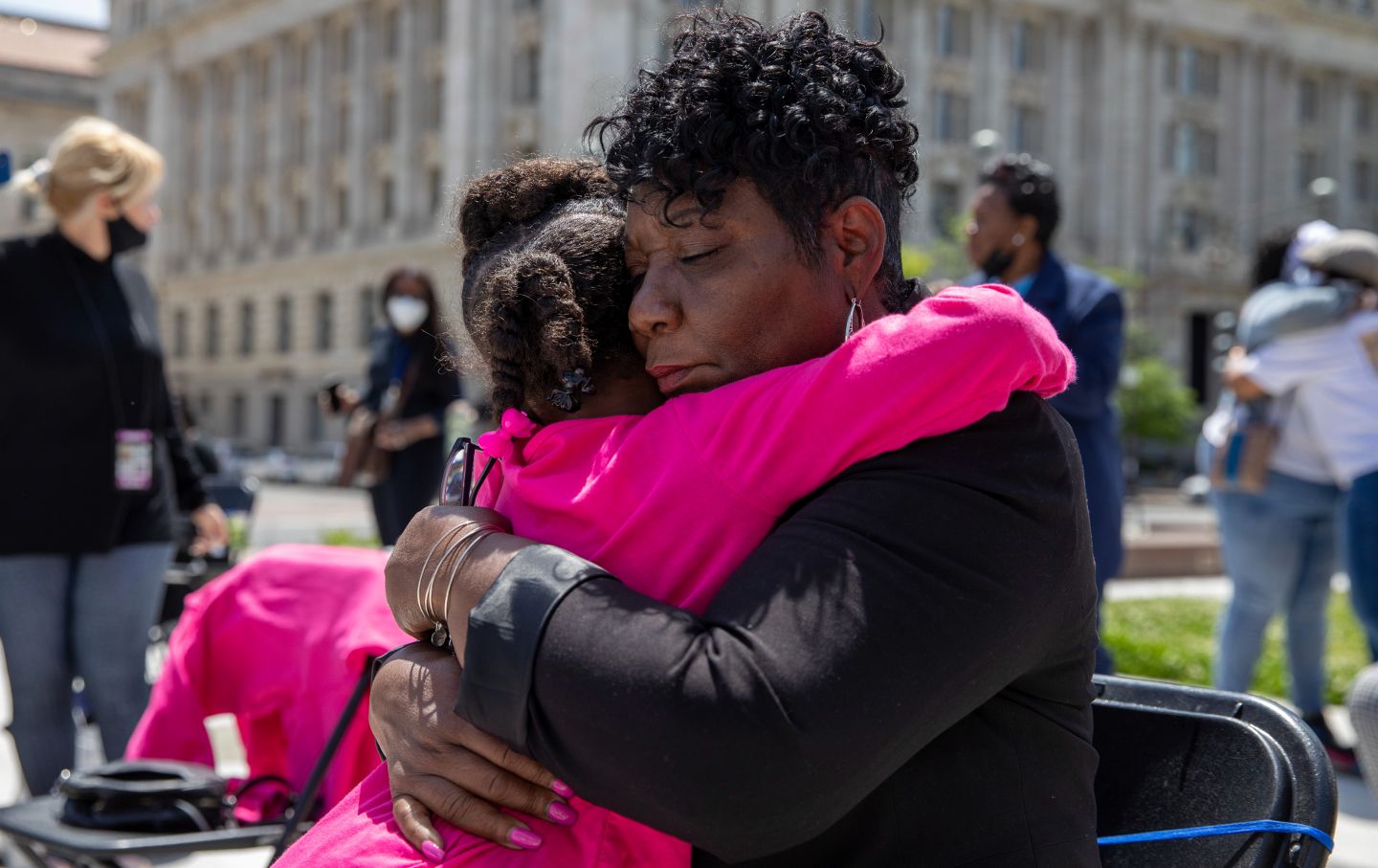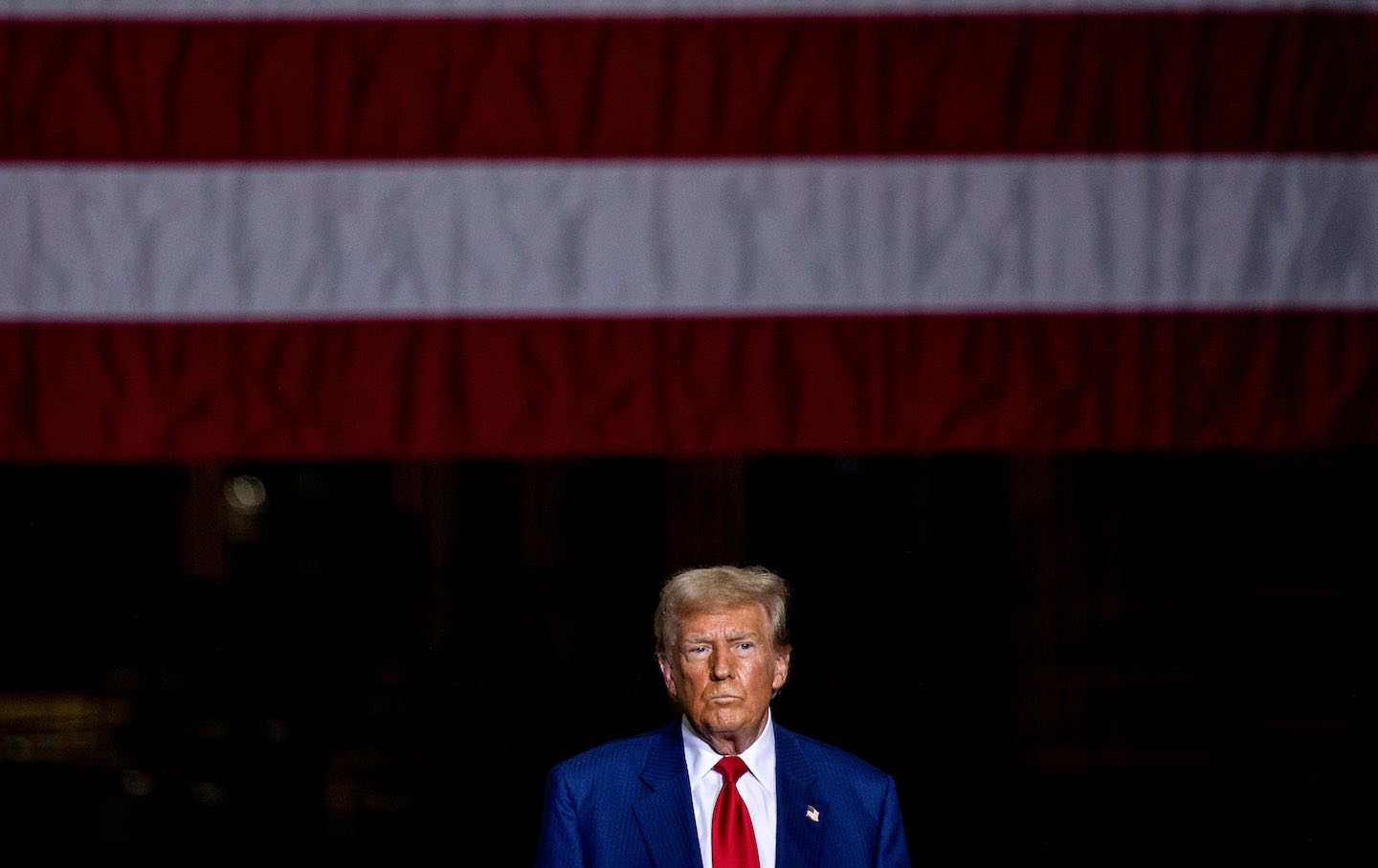The Invisible Victims of Anti-Black Policing
Racist policing is also deadly for Black women and girls—a reality that is far too often ignored or dismissed.

Kimberlé Crenshaw coined the term “intersectionality” in 1989 to describe how intertwined anti-Blackness and misogyny consign Black women to the social, political, and economic margins, often erasing their existence altogether. When Crenshaw was marching against deadly anti-Black policing more than two decades later, in 2014—as she recounts in her most recent book, #SayHerName: Black Women’s Stories of Police Violence and Public Silence—she witnessed how racial patriarchy renders even Black women’s deaths invisible. Along with the chanted names of Tamir Rice, Eric Garner, and Mike Brown, Crenshaw shouted the lesser-known names of Black women killed by police or in police custody—women like Tanisha Anderson, Shelly Frey, and Ahjah Dixon. “Several people were enraged,” Crenshaw told me. “There was the sense that we were being interlopers.”
In response, Crenshaw launched the #SayHerName campaign in 2014, seeking to honor and recognize Black women, girls, and femmes whose lives have been stolen by racist policing and to protest their state-backed killings. The need for the campaign, which includes the #SayHerName Mothers Network of surviving sisters, mothers, and other loved ones, reflects the failure of the anti-racist and feminist movements “to grasp that Black women, like Black men, are subjects of anti-Black state violence,” Crenshaw writes. #SayHerName documents how even at the 2017 Women’s March on Washington, which rightly included as speakers the mothers of sons killed by anti-Black police violence, the murders of Black women all too often remained an afterthought.
“They ignored our daughters and they pushed forward the names of the men. And this is in the middle of a Women’s March,” Gina Best, whose daughter India Kager was killed by police, said in a 2020 interview on Crenshaw’s podcast, Intersectionality Matters. “We didn’t even get an invitation.”
“We had been fighting all day to get to that stage to hear our babies’ names being uplifted and remembered in front of hundreds of thousands of people,” Vicky Coles-McAdory, the aunt of India Beatty, who was killed in 2016 by Virginia police, recalls in #SayHerName. “So that left us to feel like our babies were sacrificed.”
#SayHerName, written in partnership with the African American Policy Forum, the social justice think tank that Crenshaw cofounded and leads, offers nine intimate portraits of Black women, girls, and femmes who were killed by police, each painted through the words of their loved ones. These surviving narrators, all members of the #SayHerName Mothers Network, have borne what Crenshaw calls “the loss of the loss”—an immense grief compounded by the lack of attention given to cases in which Black women lose their lives because of police violence. Best’s daughter, a violinist and visual artist, was unarmed when Virginia Beach police put her and her 4-month-old son in the line of fire to get their intended suspect, leaving her dead as collateral damage and her son deaf in one ear. “It feels almost as if [Black men’s and boys’] murders were more important, because…their names are spoken,” Best says. “I have to be sensitive to the other mothers, again cognizant of how they feel, because that was their son. But that was my daughter, [and] I want them to say her name too.”
Crenshaw’s book makes clear that anti-Blackness carries the same risk of violence and death for Black women as it does for their brothers, fathers, and sons. Motherhood and womanhood, which offer white women protection, provide no sanctuary in gender for Black women; the damsel-in-distress trope is racially nontransferable. Nor does age protect the victims—police killed 93-year-old Pearlie Golden and 7-year-old Aiyana Stanley-Jones. The families that Crenshaw interviews tell us who these Black women, girls, and femmes truly were, upending the dehumanizing stereotypes used to justify their murders and, as Crenshaw writes, “relegate to obscurity the lives of Black women killed by the state.” Women such as Korryn Gaines, whose fatal shooting by police—as she made a sandwich for her 5-year-old son—was such a miscarriage of justice that a jury awarded the family $38 million in a civil suit. “I’ve heard all kinds of evil things, mean things, said about my daughter,” Rhanda Dormeus, Gaines’s mother, states in #SayHerName. “It’s a nightmare that we will never wake up from. We have grandchildren that won’t know how wonderful she was, and family that will forever be broken because of someone else’s split-second decision. It’s life-altering, shattering. I know all the moms feel like this…. I don’t know whether I’m coming or going sometimes, and I just gotta get a grip, because I have responsibilities.”
In between the family testimonies, Crenshaw offers historical and cultural analyses of police and societal violence against Black women. She notes that Black women make up one-third of all unarmed women killed by law enforcement, despite being just 10 percent of women in the US. What’s more, Black women are the only race-gender group in which the majority of its members killed by police are unarmed.
Including stories of state violence against Black women, girls, and femmes, Crenshaw writes, is the only way to “confront, contest, and dismantle the interlocking systems of state power that continue to routinize and normalize these killings.” In other words, feminist and anti-racism organizing and advocacy requires intersectionality, a term that right-wingers have assailed. In Florida, Governor Ron DeSantis has sought to ban the term from library stacks and AP curricula. The latter effort has apparently led the College Board to remove nearly every mention of the word from its AP African American studies framework.
Crenshaw argues that it’s difficult to imagine solutions to the systemic problems she outlines without the concept of intersectionality. “The College Board [commented] that it’s no longer a useful concept because it’s been so ‘politicized,’” Crenshaw told me. “When the right wing goes after intersectionality, we understand it’s because the concept illuminates aspects of social inequality that demand remediation—changes they don’t think should be taken up. It’s certainly still useful to those of us who care deeply about understanding what happens to those who fall in the margins. And #SayHerName shows intersectionality as people experience it.”








